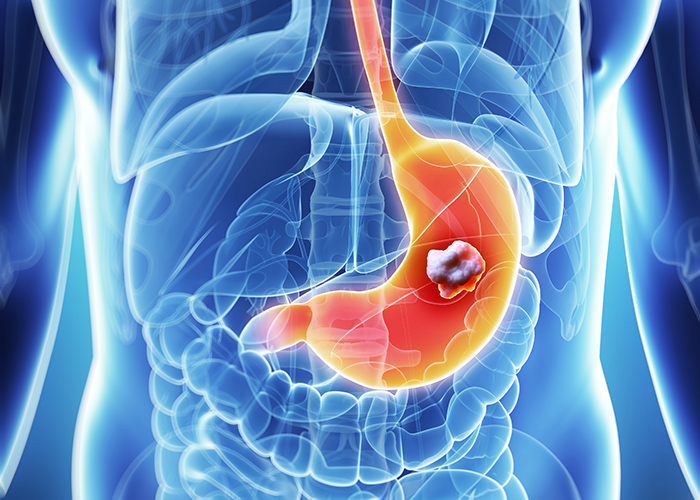What is Stomach Cancer?
 Stomach cancer, also known as gastric cancer, originates in the stomach. Approximately 27,000 individuals are diagnosed with stomach cancer each year, and it’s responsible for about 11,000 deaths per year. According to the American Cancer Society, stomach cancer is the fifth most common cancer in the world.
Stomach cancer, also known as gastric cancer, originates in the stomach. Approximately 27,000 individuals are diagnosed with stomach cancer each year, and it’s responsible for about 11,000 deaths per year. According to the American Cancer Society, stomach cancer is the fifth most common cancer in the world.
About 95% of stomach cancers are called adenocarcinomas, which develop in the innermost layer of the wall of the stomach, called mucosa. Adenocarcinomas can be divided into two classes: gastric cardia cancer and non-cardia gastric cancer or distal gastric cancel.
What Causes Stomach Cancer?
Stomach cancer occurs in the stomach when cancer cells develop in the lining of the stomach. While there are many risks associated with developing stomach cancer, researchers don’t quite understand what causes these cancer cells to develop in the stomach lining.
One reason is thought to be Helicobacter pylori (H. pylori), which has been known to be a major cause of gastric cancer, specifically distal gastric cancer. It is also linked with gastric mucosa-associated lymphoid tissue (MALT) lymphoma, another type of gastric cancer.
What are the Symptoms of Stomach Cancer?
Early-stage stomach cancer can be difficult to detect because symptoms are rarely triggered until the cancer has advanced. That being said, the following symptoms may indicate stomach cancer:
- Poor appetite
- Weight loss
- Abdominal pain
- Vague discomfort in the abdomen, usually above the navel
- A sense of fullness in the upper abdomen after eating a small meal
- Heartburn or indigestion
- Nausea
- Vomiting, with or without blood
- Swelling or fluid build-up in the abdomen
- Blood in the stool
- Anemia
If you have any of these symptoms, see your physician immediately. In some cases, symptoms are caused by something other than cancer, but the only way to rule it out completely is to consult with your doctor.
Some people may have a higher risk of developing stomach cancer than others. Risk factors include chronic gastritis, smoking, diet, blood group type, and genetics. Stomach cancer is also more prevalent in men than in women.
There is no way to prevent stomach cancer, but doctors recommend taking these additional steps to help reduce risk:
- Stop smoking
- Eat a varied diet including vegetables and fruits, avoiding pickled, salted, and cured foods
- Stay active and maintain a healthy body weight
- Treat H. pylori infection
What is the Treatment for Stomach Cancer?
Stomach cancer treatment depends on the stage of the cancer, whether the cancer is recurring, and the patient’s general health.
The three primary treatment options available for stomach cancer are:
- Surgery: The surgical option is the main treatment and includes removing the affected portion of the stomach. How much of the stomach is removed and whether it is done in conjunction with other treatments will depend on the location of the cancer, how deep it has penetrated the wall of the bowel and if it has spread to the lymph nodes or other parts of the body.
- Chemotherapy: Chemotherapy can be used after surgery to destroy any remaining cancer cells and may be recommended by the doctor if the cancer has spread beyond the stomach. Chemotherapy can be used in conjunction with radiation.
- Radiation: Radiation therapy uses powerful energy sources to kill any cancer cells that may remain after surgery or to shrink large tumors before an operation. This option is rarely used in early stages of stomach cancer.
Have questions about stomach cancer?
Schedule an AppointmentPrevention & Treatment
Upper Endoscopy (EGD)
A procedure that allows your doctor to examine parts of your upper gastrointestinal tract, including the esophagus, stomach, and small intestine. An upper endoscopy can help determine causes for heartburn, the presence of hiatal hernias, the cause of abdominal pain, unexplained anemia, and the cause of swallowing difficulties, upper GI bleeding and the presence of tumors or ulcers.
Learn MoreEndoscopic Ultrasound (EUS)
A procedure that examines your esophageal and stomach linings and the walls of the upper and lower gastrointestinal tract. The procedure is performed using an endoscope, which is a thin, flexible tube equipped with a tiny camera and ultrasound device that allow the physician to view any affected regions of your gastrointestinal tract and make a much more accurate diagnosis.
Learn More